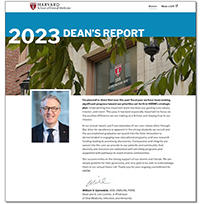
As artificial intelligence (AI) is increasingly being used in many facets of health care including dentistry, the authors of a recently-published opinion piece in JAMA Health Forum discuss ways AI can help level the playing field to achieve greater oral health equity.
Harvard School of Dental Medicine (HSDM) faculty members Hawazin Elani, assistant professor in Oral Health Policy and Epidemiology, and William Giannobile, dean and A. Lee Loomis, Jr. Professor of Oral Medicine, Infection and Immunity, point to AI’s potential to reduce health disparities in three ways starting with the ability to enable earlier diagnoses and intervention. By overlaying radiographic and biomarker information with clinical and socioeconomic data the authors say interventions could be more effectively targeted.

Secondly, Giannobile and Elani suggest that AI-powered technologies can help identify high-risk populations and offer preventative care before more costly restorative dental care is needed, minimizing the financial barriers that currently exist for low-income patients seeking care.
And lastly, they suggest that access to dental care could be expanded by AI solutions automating the time-consuming administrative tasks associated with participating in public insurance programs, which would encourage more dentists to treat underserved populations, and expand care options.
While these areas are promising for the application of AI, the authors also call for caution when evaluating the AI tools rapidly coming on the market.

Elani and Giannobile suggest that academic dental institutions, in collaboration with industry and governmental agencies, have a part to play in evaluating the safety and efficacy of competing AI technologies, and training future clinicians to be ready to use AI tools responsibly.
“HSDM convened stakeholders in industry, clinical practice, and academia last fall for a global symposium on the future of AI in dentistry. There was a dynamic exchange of ideas,” Giannobile said. “This underscores the role academia can play in bringing together different stakeholders and fostering a shared responsibility in the development of AI to improve oral health for all.”


